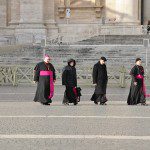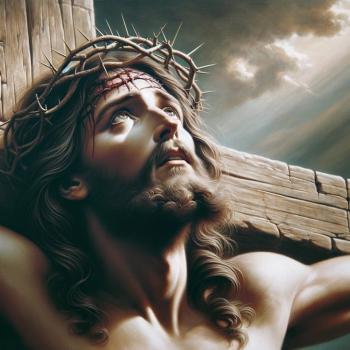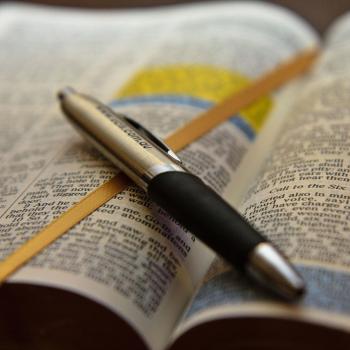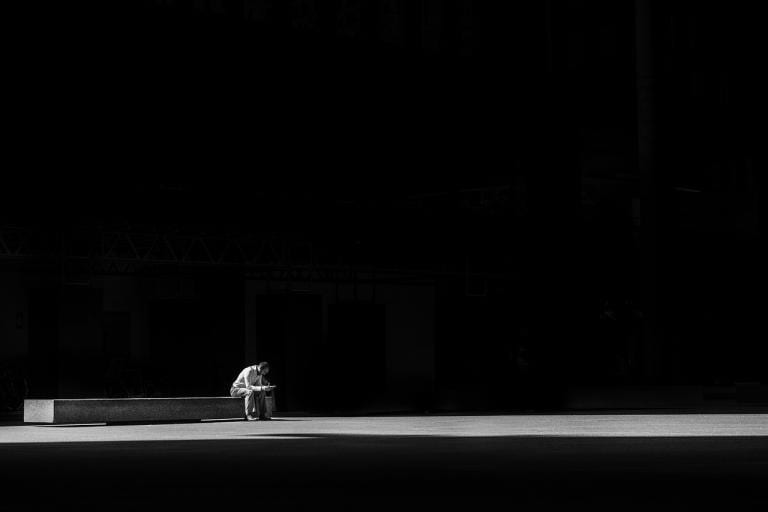Last time I talked about the backdrop for my concerns about infallibility. Today, I want to talk about where I’m at right now.
Before I do that, I want to emphasize that this is something I’ve been pretty hesitant to address directly. I’ve had my doubts going back a long time, but I was afraid that I might be wrong, and I was concerned about disturbing other people’s faith. I’m still concerned about that.
I realize that there are those who need the kind of certainty that infallibility promises. Sometimes this is just a phase that people go through, the same way that small children need clear rules. Sometimes it’s a matter of personality: some people thrive really well with a lot of structure and the structure provided by the Church helps them to live fruitful and happy lives.
For others, it’s a matter of axiom. All axiomatic statements are, when it comes down to it, statements of faith, and for some Catholics the claim that the Church teaches infallibly in matters of faith and morals is an axiomatic claim. They believe it in the same way that rationalists believe in reason, and Bible-Christians believe in the Bible, and some atheists believe in science. I know from experience that having your foundation-level axioms toppled is excruciating, it leads to existential crisis, and frankly most people just don’t seem willing to go there more than once or twice in a lifetime.
So that’s my caveat. If the thought that the Church might actually not be infallible causes the gut to churn, and the blood to boil and makes the hairs of your neck stand on end like quills upon the fretful porpentine, then you don’t need to read this. I’m serious about that. Not everyone is called to fight in every battle, and honestly, choosing real-life equilibrium is sometimes the more virtuous and prudent course.
That said, I’ve reached a point where I can no longer, in good faith, leave this problem alone. I’ve been wrestling with it for a long time, and I’ve come to the conclusion that Papal infallibility is probably just not true. I think the evidence in favour of it is quite weak and largely circular, and that the evidence against it is fairly strong.
First, there’s a very simple principle that I apply to truth claims in almost all cases – but that for some reason I didn’t apply to the infallibility claim. This is the principle that if someone makes an absolute statement about their own authority, or the authority of a class or organization to which they belongs, you should be very skeptical. Your evaluation of the claim should always take into account that the person who is making it has a vested interest in it being true.
This is particularly essential when the name of God is invoked in order to back the claim up. We know that it’s quite common for human beings to invoke the authority of God in order to bolster their own power and credibility. Whether it’s a king claiming to rule by divine right, or a popular best-selling author claiming to have a direct revelation from God, or a sidewalk preacher claiming to be a prophet, we all know that the rational, ordinate response is to treat claims of special divine favour with suspicion.
Meaning, the person who is making the claim (or anyone who is making the claim on their behalf) needs to put forward a really compelling case. You should be able to look at the words and behaviour of the person or organization that has allegedly been granted this extraordinary grant of divine power, and you should be astonished by the degree to which they have been exemplary in conduct and truthful in speech.
There is only one case that I am aware of in the history of the human race that comes even close to fulfilling this condition. That is Christ’s claim to divinity. His wisdom and holiness leap off the pages of the Gospels. Of all the people who have ever claimed to be God incarnate, His behaviour stands out as surprising, unpredictable, and unique. He doesn’t come off as self-interested, He doesn’t grasp after power, He doesn’t ask for money. He doesn’t benefit from His claim to be the Son of God. Quite the opposite.
Christ, as a person, is sufficiently compelling that even when I read the Gospels as an atheist (with the express intent of rooting out and exposing the lies), I had to stop as soon as I got to Gethsemene. I couldn’t bring myself to scoff at this man the way I had been able to scoff at the writers of the Old Testament. He was something else.
The Catholic Church, on the other hand, kind of isn’t. When I first converted I thought that She was. I read a lot of things written by apologists who claimed that there was a unique, unbroken chain of teaching which never contradicted itself and remained pure and undefiled throughout two thousand years of history. They had a version of history that supported this claim. There were stories of Popes who were on the verge of teaching heresy, but who converted to orthodoxy on the very day that they were elevated to Peter’s throne. There were rumours of Popes who had been struck dead by God on the eve of some dastardly proclamation. It sounded impressive.
And because John Paul II, who was a very intelligent and holy man, happened to be Pope at the moment of my conversion I found this account somewhat compelling. Probably it helped that I was surrounded by other eager young converts who were swept up in the same enthusiasm. And if I’m completely honest, I have to admit that it was kind of gratifying to believe that I had successfully navigated the seas of truth and had arrived at a safe and secure harbour. If I’m going to be even more honest, part of the appeal was that it tickled my intellectual pride to feel that I had access to infallible truth while my interlocutors were all stumbling along in error.
But then I started studying history. At first I was scandalized. I thought that the scholars and lecturers were basically lying, or at the very least twisting facts to make the Church look bad. I’d always been told that academia had a strong anti-Catholic bias, and I was wary. So I went and dug up the primary source documents: old Papal encyclicals and Papal bulls from hundreds of years ago.
And my heart sank.
The kind of measured, rational, charitable, paternal, and often humble tone that I was used to in modern Papal writings was starkly absent. These were not the writings of men like John Paul II, Benedict XVI or Francis. These were edicts issued from on high by powerful men with blatantly political agendas.
I encountered several cases where Popes used their teaching authority to advance selfish, politically motivated, worldly ends. Christians were promised spiritual dividends for fighting in the Pope’s wars. Hard-won treaties were condemned (in highly spiritualized language no less) because they resulted in a loss of too much Church land. The slaughter of heretics was commended, and the claim that such slaughter offended the Holy Spirit was condemned.
Worse, there were several teachings that just did seem to have changed over the years. Extra ecclesiam nulla salus is the most famous teaching to have undergone such a radical “development of doctrine” that it has come to mean almost the opposite of what it originally meant, but there are others. The subordination of women to men within marriage. The permissability of marriage between people of different faiths. The right to religious freedom. The legitimacy of sexual desire and pleasure. The toleration of lending at interest. And so on.
Now, I am familiar with the kind of elaborate explanations that apologists give to try to explain away these changes and contradictions, but here’s the rub: when you’re defending Christ’s claim to divine power, you don’t have to play those games. You don’t have to make excuses to explain away the contradictions in His teaching or the shocking evils that He committed and justified during the course of His ministry. His integrity shines out in a way that the integrity of the Papacy simply does not.
Which brings me back to that original principle: that is someone is claiming to wield authority on behalf of God, they have to be able to back that up with really strong and compelling proof. I honestly don’t think that if you step back and just try to evaluate the claim of infallibility on its own merits, without assuming it as a foregone conclusion, that there is anything like enough evidence to hold it up.
If a claim like this were true, and God really wanted us to know that He was intervening to prevent the Popes from teaching error, I would expect it to shine out like a city on a hill. I don’t think that He would require armies of theological spin-doctors to explain away all of the times when it really looked like the Popes had been selfish, power-hungry or just plain wrong.
Which leaves us with another possibility: that at the First Vatican Council, a group of fallible men fallibly proclaimed their leader to be infallible.
This possibility fits the facts too well. It’s elegant. It’s credible. We know that such things happen. History is full of examples of men behaving in this way. Sometimes they were even good men, men who held legitimate authority, men who sincerely believed that they were proclaiming God’s truth or fulfilling God’s commands. Fallible human beings who got a little too big for their britches. Fallible human beings who saw their authority waning, panicked, and doubled down. Fallible human beings who mistook their own interests for the will of God.
Humans make mistakes like this. And unfortunately, the Holy Spirit does not magically protect us from making them – even when we purport to speak in God’s name. Such errors are understandable, they’re forgivable, but they’re also a serious problem when they lead to rigidity, to the perpetuation of errors once made, and to an inability to apologize or repent.
Alright, so that’s the Bad News according to Melinda. Next time I want to talk about the difference between infallibility and authority, and why I’ve decided to work on rebuilding trust in the Church.
Image credit: pixabay
Stay in touch! Like Catholic Authenticity on Facebook:

















